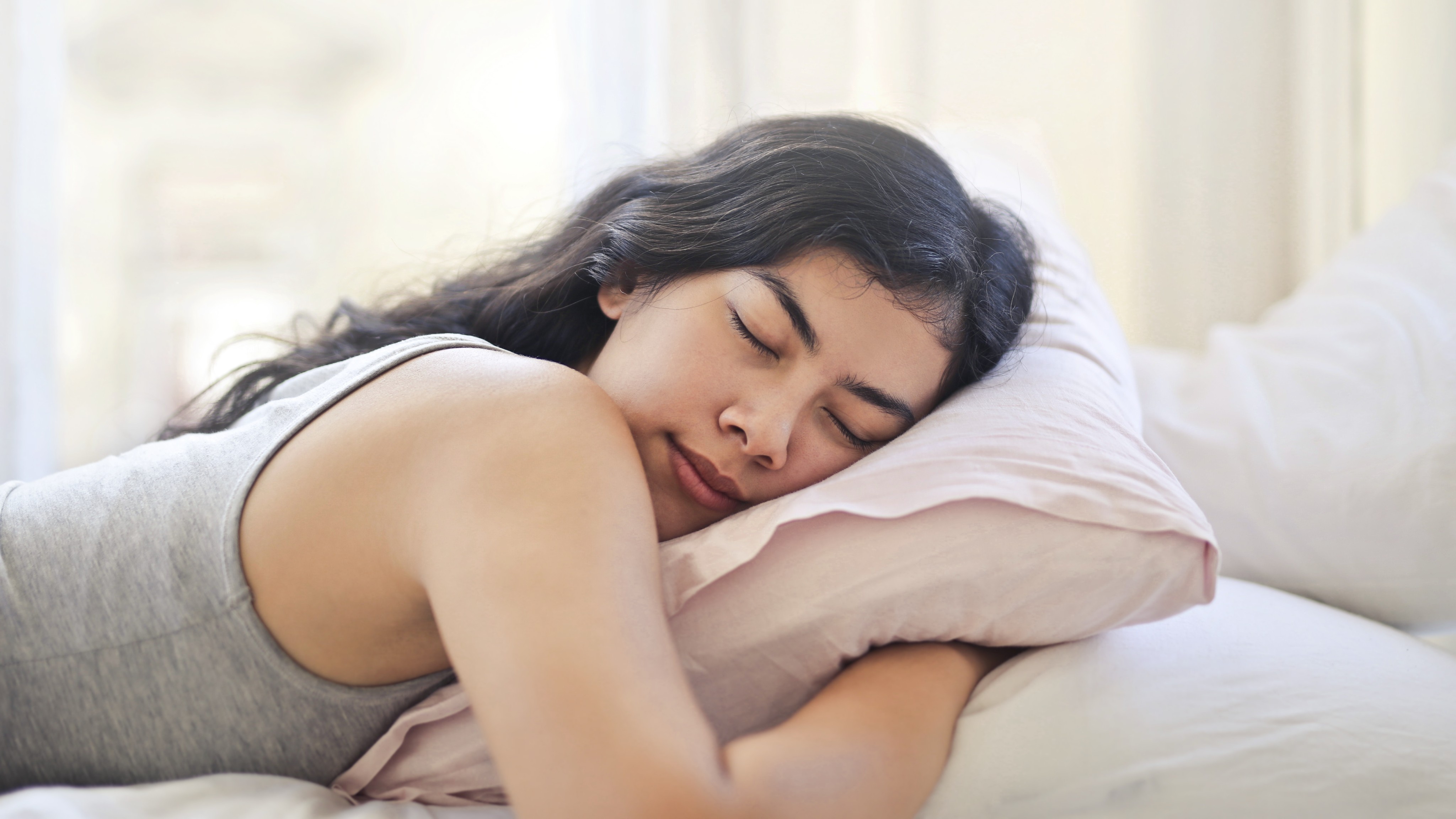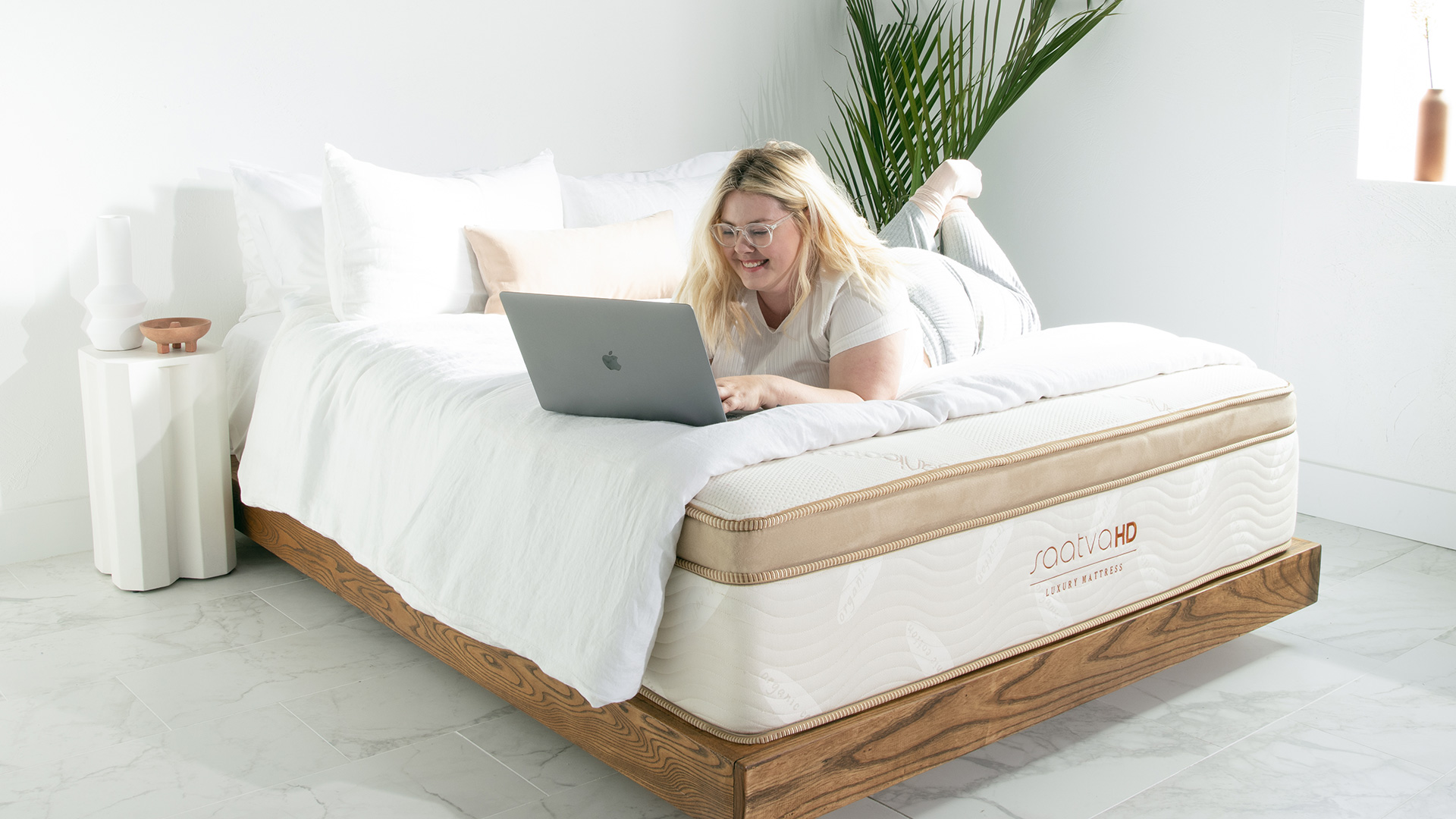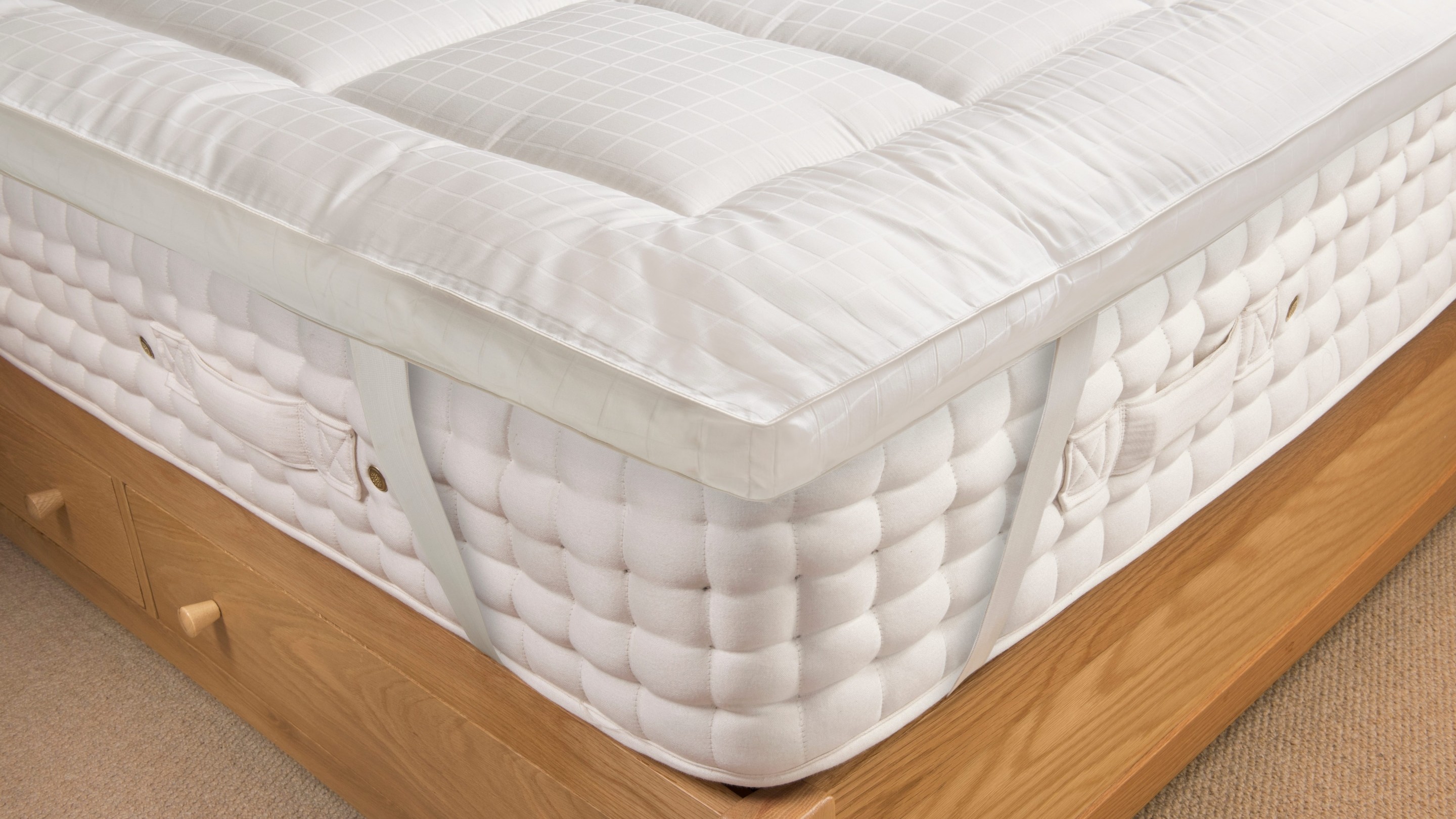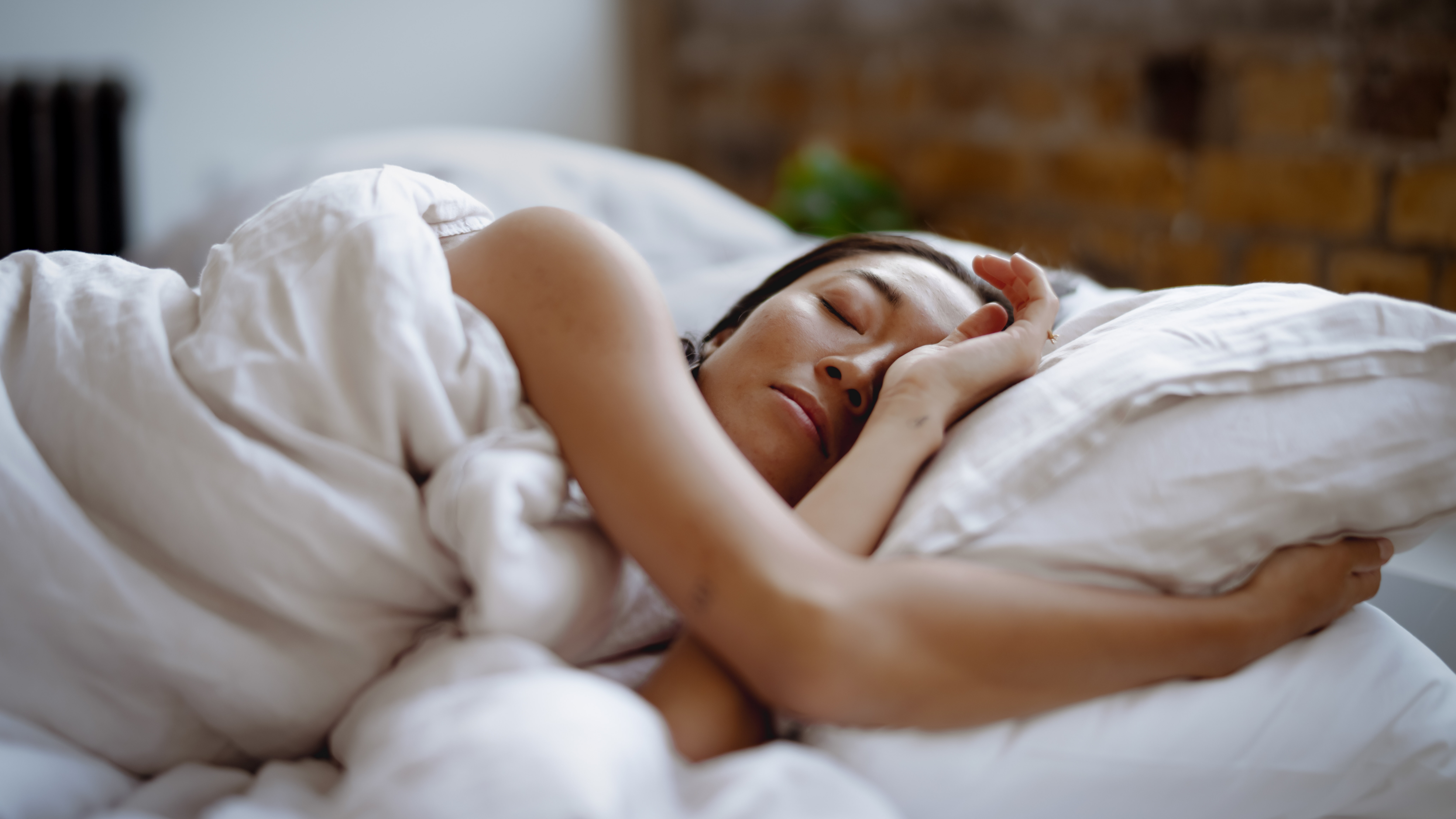

Bethan Girdler-Maslen
Looking for the best mattress for comfort and support? One thing you need to take into account is firmness. Firmness is usually described by mattress manufacturers as somewhere on a spectrum between one and 10, where one is the softest and 10 is the firmest. On a soft mattress, you expect to sink into it, while on a firm mattress you’ll feel more like you’re lying on top.
In truth, you’re unlikely to encounter either a one or 10 mattress because both would be incredibly uncomfortable. The softest mattresses that are available fall between three and five, and a person of average weight would expect to sink around 1.5 - three inches into them.
A medium mattress is between six and seven, and an average person would expect to sink around 1-2 inches into one. A firm mattress is between 7.5 and nine, where you’re basically lying on top and not sinking in very much at all.
Please note, though, this system is not as precise as, say, shoe sizes. Different companies have different ideas of mattress firmness, for example, a 6.5 level of firmness from Emma might be different than that from Simba. This can be frustrating for both consumers and mattress reviewers alike but it does give you a broad idea whether a mattress is closer to medium-firm than very soft or very firm.
With all that in mind, how do you determine which level of firmness is right for you?
Mattress firmness: what you need to consider

A firm mattress like the Saatva HD is a great choice for heavier people
The level of firmness you need in a mattress will vary according to a number of factors. The first is your sleep position. If you’re a back sleeper, you’ll want to avoid a soft mattress. That’s because your shoulders and legs will sink into it, creating a curved spine that is likely to cause you pain and discomfort over time (this is known as anterior pelvic tilt).
If you’re a stomach sleeper, you’ll have a similar problem on a soft mattress. In this case, your core will sink in relation to your arms, neck and head, leading to the same kind of spinal misalignment.
Sign up to the T3 newsletter for smarter living straight to your inbox
Get all the latest news, reviews, deals and buying guides on gorgeous tech, home and active products from the T3 experts
Conversely, if you’re a side sleeper, you’ll want to avoid a firm mattress, as it will put too much pressure on your hips and shoulders. You’re better off with a softer mattress that allows these parts of your body to sink into the mattress a little more. That said, you still don’t want to go too soft, because then you run the risk of poor spinal alignment, which can be just as bad for your health.
Besides sleeping position, another important factor is your body weight. The heavier you are, the firmer you'll need your mattress to be to support you properly, and vice-versa.
That’s why mattress firmness is so subjective: a 6.5 can feel medium-firm to someone of average weight, medium to a heavy person, and firm to a light person! Certainly, if you weigh more than 250 pounds, you’ll want a very firm mattress: check out our roundup of the best mattresses for heavy people to learn more.
It's also important to consider if you're a hot sleeper. If you tend to overheat on a warm night, a soft mattress might be a bad idea. These mattresses tend to be less cooling because you sink more into them, compacting the material and reducing airflow. Soft mattresses are also usually made with memory foam, which is notoriously for trapping body heat and reflecting it back at you.
Another reason to opt for a firmer mattress is if you move around a lot at night, as a firmer mattress makes to change positions, or get out of bed, without feeling stuck. For similar reasons, couples may prefer a firmer mattress, as it means you’re less likely to wake each other when you shift about during your sleep.
Mattress firmness: Individual and cultural habits
You’d think that manufacturers would be able to take all these variables, enter them into an app, and give you a clear result for your ideal level of firmness, right? Unfortunately that’s not possible, for two reasons.
Firstly, everyone’s body is unique. Secondly, we’ve all spent a lifetime learning mattress habits that are very difficult to unlearn. Quite simply, if you’ve spend your entire life sleeping on a soft mattress, your body might not be able to cope with suddenly switching to a firm one, however logical it may seem based on the factors discussed above.
There are also regional, national and cultural differences at play here. Europeans, for example, tend to go for mattresses on the firmer side, while North Americans tend towards to softer ones. Most Japanese people, meanwhile, sleep on the floor on futons: three inch thick ‘mattresses’ that are in truth are more like mats. Sadly, Westerners who spend months trying to conform to said social norm (this writer included) usually end up with nothing but back pain and misery as a result.
Mattress firmness: The benefit of experience

A topper such as this one from Soak and Sleep can make your mattress softer
In short, the most important guide to what kind of mattress you should choose is what you’ve enjoyed before. Do, however, be careful on that score.
For example, it’s easy to think back to that wonderful night you spend on a cloud-like hotel bed during a great holiday, and assume that’s the kind of mattress you should use full-time. But be honest: was the mattress the reason for your good night’s sleep? Or was it all that sea air, alcohol, relaxation and absence of work emails?
A far better guide is the kind of mattress you’ve been using for the last 10 years. If you’ve enjoying a good night’s sleep, don’t have any problems with your joints or back, and haven’t recently altered your lifestyle (such as moving in with a partner, or adopting a new sleeping position to stop snoring), you should probably stick to what works.
Even if you're having problems sleeping, don’t rush to change your mattress, but check out whether other remedies can help. For example, if you’re experiencing back or joint pain then consult a GP or qualified chiropractor, before making uninformed changes to your mattress that might make things worse.
Mattress firmness: Changing things up
Still think a change in firmness levels is necessary? Then it's worth experimenting first, just to confirm your suspicions. For example, you could make your existing your mattress firmer by temporarily placing it on the floor, or putting a wooden board underneath it. Or if you want to make a firm mattress softer, you could try adding a mattress topper.
Ultimately, the only way to really know if a softer or firmer mattress will work for you is to try it out. Thankfully, most mattress companies offer free trials that last for several months; some even let you keep it for a whole year. Just be careful to read the small print because some companies (though no means all) charge you an extra fee for returning your mattress (see our guide to mattress guarantees for more details).
If they don’t, you’ll have plenty of opportunities to find the mattress firmness level that’s right for you. Don’t feel guilty for doing so, because ultimately staff at mattress companies want you to have a good night’s sleep, too.
Tom May is a freelance writer and author of the book, Great Ted Talks: Creativity. He has been editor of Professional Photography magazine, associate editor at Creative Bloq, and deputy editor at net magazine. He has also worked for a wide range of mainstream titles including Radio Times, NME, Heat, Company and Bella.
- Bethan Girdler-MaslenHome Editor
-
 Driven to distraction: the ultimate luxury cars to sit in the back of
Driven to distraction: the ultimate luxury cars to sit in the back ofWhen you’re being driven rather than driving, these are the cars that will let you arrive in style
By Mat Gallagher Published
-
 I tested every new Tudor at Watches and Wonders – my favourite caught me by surprise
I tested every new Tudor at Watches and Wonders – my favourite caught me by surpriseThe Rolex sister brand had a lot to offer
By Sam Cross Published
-
 I spent 6 weeks with the FoodMarble Aire 2: here’s what I learned about my gut health
I spent 6 weeks with the FoodMarble Aire 2: here’s what I learned about my gut healthI’ve been testing the clever breath-testing gadget with the companion app over several weeks to find out if it delivers on its promises
By Lee Bell Published
-
 Oil pulling is going viral on TikTok for stopping morning breath – but does it actually work?
Oil pulling is going viral on TikTok for stopping morning breath – but does it actually work?4 hacks that prevent morning breath, according to a sleep expert
By Bethan Girdler-Maslen Published
-
 These limited edition McLaren x Loop earplugs are what you need for Formula 1 season
These limited edition McLaren x Loop earplugs are what you need for Formula 1 seasonMcLaren teams up with Loop on limited edition noise-reducing earplugs
By Bethan Girdler-Maslen Published
-
 5 sleep supplements that help me achieve 8+ hours of rest every night
5 sleep supplements that help me achieve 8+ hours of rest every nightIt took me years to perfect my sleep routine – here are the supplements that helped
By Lizzie Wilmot Published
-
 3 reasons why you wake up at 3am every night – and how to avoid it
3 reasons why you wake up at 3am every night – and how to avoid itAlways waking up in the middle of the night? This could be why…
By Bethan Girdler-Maslen Published
-
 This tiny device will automatically disable your distracting apps before you sleep
This tiny device will automatically disable your distracting apps before you sleepSay hello to Kip...
By Lizzie Wilmot Last updated
-
 Therabody experts give 7 tips for perfecting your sleep routine for World Sleep Day
Therabody experts give 7 tips for perfecting your sleep routine for World Sleep DayFrom breathing exercises to sleep masks, here’s how to prioritise sleep, according to experts
By Bethan Girdler-Maslen Published
-
 Loop Dream review: super soft earplugs to help you snooze soundly, even if you’re a side sleeper
Loop Dream review: super soft earplugs to help you snooze soundly, even if you’re a side sleeperSquishy silicone and uniquely shaped ear tips take Loop’s nighttime earplugs to dreamy heights
By Joanna Ebsworth Published